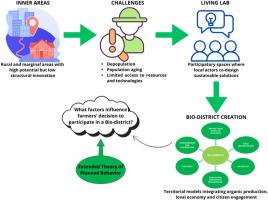Innovation in inner areas: How Living Labs support green transition and bio-district success
IF 5.6
Q1 ENVIRONMENTAL SCIENCES
引用次数: 0
Abstract
Bio-districts represent an innovative governance tool that fosters cooperation among farmers, institutions, and other local actors to promote environmental sustainability, economic resilience, and social cohesion in rural areas. However their implementation requires the active engagement of farmers, whose willingness to participate is influenced by a range of psychological and institutional factors. This study investigates the factors influencing organic farmers’ intention to join a potential Bio-district in the Calatino area (Sicily, Italy), applying an Extended Theory of Planned Behaviour (ETPB) framework that includes Perceived Utility and Trust in Government. A survey was conducted with 143 organic and transitioning farmers. Data were collected through a participatory Living Lab approach, which provided space for dialogue, knowledge exchange, and co-learning. The results show that Attitude (β = 0.649; p < 0.001) and Subjective Norms (β = 0.231; p < 0.01) positively influence the Intention to join the Bio-district, while Perceived Behavioural Control is not significant. Furthermore, Perceived Utility (β = 0.410; p = 0.001) and Trust in Government (β = 0.173; p = 0.055) indirectly influence Intention through Attitude. The participatory approach of the Living Lab facilitated data collection and encouraged farmer involvement, providing a shared learning environment and helping to build trust among local actors. The study offers concrete recommendations for public policy: strengthening institutional trust, communicating the tangible benefits of membership, and adopting participatory tools can promote the adoption of sustainable agricultural models in marginal rural contexts.

内部区域的创新:Living Labs如何支持绿色转型和生物区的成功
生物区是一种创新的治理工具,可促进农民、机构和其他地方行动者之间的合作,以促进农村地区的环境可持续性、经济复原力和社会凝聚力。然而,它们的实施需要农民的积极参与,他们的参与意愿受到一系列心理和体制因素的影响。本研究运用扩展计划行为理论(ETPB)框架,包括感知效用和对政府的信任,调查了影响意大利西西里岛卡拉提诺地区有机农民加入潜在生物区的意向的因素。对143名有机农民和转型农民进行了一项调查。通过参与式生活实验室方法收集数据,为对话、知识交流和共同学习提供空间。结果表明,态度(β = 0.649; p < 0.001)和主观规范(β = 0.231; p < 0.01)正向影响学生加入生物区的意愿,而感知行为控制(Perceived Behavioural Control)对其影响不显著。感知效用(β = 0.410, p = 0.001)和政府信任(β = 0.173, p = 0.055)通过态度间接影响意向。生活实验室的参与式方法促进了数据收集,鼓励农民参与,提供了一个共享的学习环境,并有助于在当地行动者之间建立信任。该研究为公共政策提供了具体建议:加强机构信任,宣传成员资格的切实利益,以及采用参与性工具可以促进在边缘农村地区采用可持续农业模式。
本文章由计算机程序翻译,如有差异,请以英文原文为准。
求助全文
约1分钟内获得全文
求助全文
来源期刊

Environmental and Sustainability Indicators
Environmental Science-Environmental Science (miscellaneous)
CiteScore
7.80
自引率
2.30%
发文量
49
审稿时长
57 days
 求助内容:
求助内容: 应助结果提醒方式:
应助结果提醒方式:


